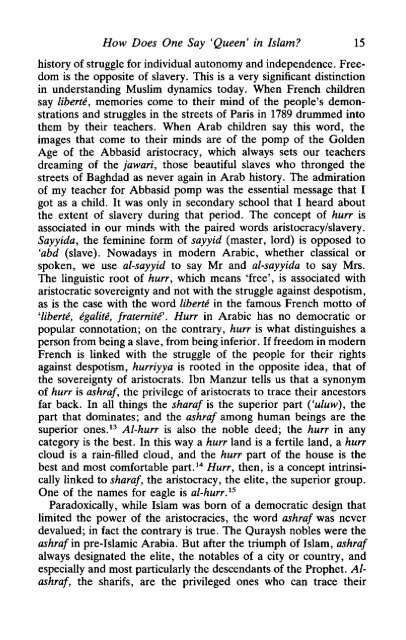Fatima.Mernessi_The-Forgotten-Queens-of-Islam-EN
Fatima.Mernessi_The-Forgotten-Queens-of-Islam-EN
Fatima.Mernessi_The-Forgotten-Queens-of-Islam-EN
You also want an ePaper? Increase the reach of your titles
YUMPU automatically turns print PDFs into web optimized ePapers that Google loves.
How Does One Say 'Queen' in <strong>Islam</strong>? 15<br />
history <strong>of</strong> struggle for individual autonomy and independence. Freedom<br />
is the opposite <strong>of</strong> slavery. This is a very significant distinction<br />
in understanding Muslim dynamics today. When French children<br />
say liberte, memories come to their mind <strong>of</strong> the people's demonstrations<br />
and struggles in the streets <strong>of</strong> Paris in 1789 drummed into<br />
them by their teachers. When Arab children say this word, the<br />
images that come to their minds are <strong>of</strong> the pomp <strong>of</strong> the Golden<br />
Age <strong>of</strong> the Abbasid aristocracy, which always sets our teachers<br />
dreaming <strong>of</strong> the jawari, those beautiful slaves who thronged the<br />
streets <strong>of</strong> Baghdad as never again in Arab history. <strong>The</strong> admiration<br />
<strong>of</strong> my teacher for Abbasid pomp was the essential message that I<br />
got as a child. It was only in secondary school that I heard about<br />
the extent <strong>of</strong> slavery during that period. <strong>The</strong> concept <strong>of</strong> hurr is<br />
associated in our minds with the paired words aristocracy/slavery.<br />
Sayyida, the feminine form <strong>of</strong> sayyid (master, lord) is opposed to<br />
'abd (slave). Nowadays in modern Arabic, whether classical or<br />
spoken, we use al-sayyid to say Mr and al-sayyida to say Mrs.<br />
<strong>The</strong> linguistic root <strong>of</strong> hurr, which means 'free', is associated with<br />
aristocratic sovereignty and not with the struggle against despotism,<br />
as is the case with the word liberte in the famous French motto <strong>of</strong><br />
'liberte, egalite, fraternite'. Hurr in Arabic has no democratic or<br />
popular connotation; on the contrary, hurr is what distinguishes a<br />
person from being a slave, from being inferior. If freedom in modern<br />
French is linked with the struggle <strong>of</strong> the people for their rights<br />
against despotism, hurriyya is rooted in the opposite idea, that <strong>of</strong><br />
the sovereignty <strong>of</strong> aristocrats. Ibn Manzur tells us that a synonym<br />
<strong>of</strong> hurr is ashraf, the privilege <strong>of</strong> aristocrats to trace their ancestors<br />
far back. In all things the sharaf is the superior part ('uluw), the<br />
part that dominates; and the ashraf among human beings are the<br />
superior ones. 13 Al-hurr is also the noble deed; the hurr in any<br />
category is the best. In this way a hurr land is a fertile land, a hurr<br />
cloud is a rain-filled cloud, and the hurr part <strong>of</strong> the house is the<br />
best and most comfortable part. 14 Hurr, then, is a concept intrinsically<br />
linked to sharaf, the aristocracy, the elite, the superior group.<br />
One <strong>of</strong> the names for eagle is al-hurr. 15<br />
Paradoxically, while <strong>Islam</strong> was born <strong>of</strong> a democratic design that<br />
limited the power <strong>of</strong> the aristocracies, the word ashraf was never<br />
devalued; in fact the contrary is true. <strong>The</strong> Quraysh nobles were the<br />
ashraf in pre-<strong>Islam</strong>ic Arabia. But after the triumph <strong>of</strong> <strong>Islam</strong>, ashraf<br />
always designated the elite, the notables <strong>of</strong> a city or country, and<br />
especially and most particularly the descendants <strong>of</strong> the Prophet. Alashraf,<br />
the sharifs, are the privileged ones who can trace their


